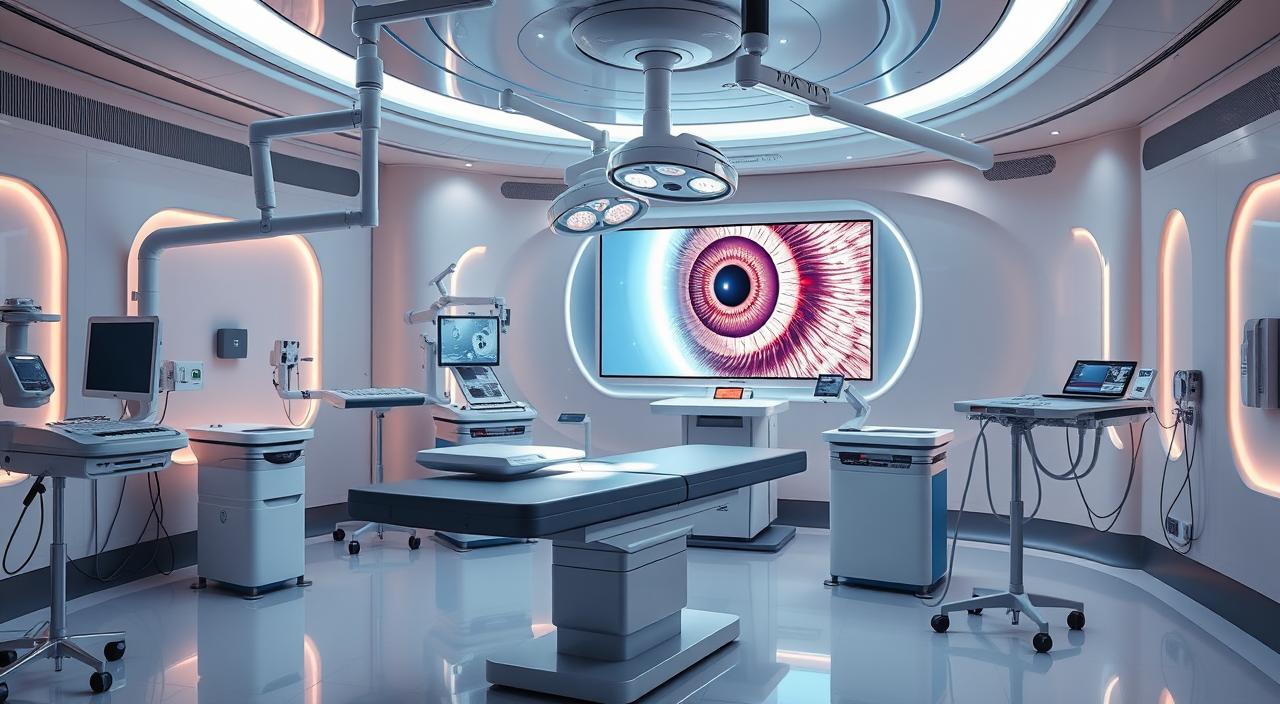Laser eye surgery is a popular choice for those tired of glasses or contact lenses. It offers a chance to correct vision without these aids. This makes it important to look at the good and bad sides of Laser eye surgery.
Many people are choosing Laser vision correction for better eyesight. Studies show it’s a favorite for vision improvement. But, it’s key to know the benefits and risks, like dry eyes and other issues.
Key Takeaways
- Laser eye surgery is a popular choice for vision correction
- It’s essential to consider the Pros And Cons Of Laser Eye Surgery before making a decision
- Laser vision correction can improve vision and reduce dependence on glasses or contact lenses
- Potential risks and complications include dry eyes and overcorrections
- Researching and understanding the procedure is critical for making an informed choice
What is Laser Eye Surgery?
Laser eye surgery, also known as LASIK, reshapes the cornea with an excimer laser. This improves how the eye focuses light. It offers many LASIK benefits, like better vision and less need for glasses or contacts.
The results of Laser eye surgery can differ based on the surgery type and individual needs. There are various laser eye surgeries, like LASIK, PRK, and LASEK. Each has its own advantages and things to consider.
Explanation of the Procedure
The surgery makes a thin flap in the cornea. This flap is then lifted to show the tissue underneath. The excimer laser reshapes the cornea, and the flap is put back to heal on its own.
Types of Laser Eye Surgery
Some well-known laser eye surgeries are:
- LASIK (Laser-Assisted In Situ Keratomileusis)
- PRK (Photorefractive Keratectomy)
- LASEK (Laser-Assisted Subepithelial Keratomileusis)
Common Uses
Laser eye surgery is used to fix vision issues like nearsightedness, farsightedness, and astigmatism. Knowing about the procedure and its types helps people decide if laser eye surgery is right for them. They can then enjoy the LASIK benefits firsthand.
Benefits of Laser Eye Surgery
Laser eye surgery improves vision and reduces the need for glasses or contact lenses. It also has a quick recovery time. The advantages of PRK make it a top choice for many. It’s cost-effective in the long run, saving money on glasses, lenses, and solution.
Some key benefits include:
- Improved vision: It can greatly improve your vision, reducing the need for glasses or contact lenses.
- Quick recovery time: Most people recover in just a few days, with some seeing better right after.
- Long-term cost-effectiveness: The initial cost can be offset by long-term savings on glasses, lenses, and solution.
Studies show PRK is safer than other laser eye surgeries. Advanced technology makes it safe and effective.
In summary, laser eye surgery offers many benefits. These include better vision, less need for glasses or lenses, and quick recovery. Its long-term cost-effectiveness makes it a popular choice. By looking at the Laser eye surgery costs and PRK’s advantages, patients can make informed decisions about their eye care.
Risks of Laser Eye Surgery
Laser eye surgery has its risks and complications, just like any surgery. It’s important to know these risks to make a good choice. The Risks of LASIK and Side effects of vision correction surgery can be serious. You should think about them carefully before deciding.
Some possible problems include seeing halos or having dry eyes. There’s also a chance of the surgery not correcting your vision enough or too much. Choosing a skilled surgeon and following their advice can help avoid these issues.
Here are some risks and complications to think about:
- Visual disturbances, such as halos or dry eye
- Overcorrection or undercorrection
- Infection or inflammation
Talking to your surgeon about these risks is key. Understanding the Risks of LASIK and Side effects of vision correction surgery helps you make a smart choice. This way, you can get the best results for your eyes.
Success Rates of Laser Eye Surgery
Laser vision correction is a popular choice for improving vision. It has high success rates and few complications. NVISION research shows most patients see big improvements in their vision.
The success of the surgery depends on several factors. These include the type of procedure, the surgeon’s skill, and the patient’s eye health. Laser eye surgery often means quicker recovery and less pain compared to traditional methods. For instance, a study on prosancons found it’s a quick and minimally invasive procedure.
Some main advantages of laser eye surgery are:
- Improved vision
- Less need for glasses or contacts
- Quick recovery
Research also shows high patient satisfaction. Many experience significant improvements in their quality of life. Knowing the success and benefits of laser eye surgery helps people make better choices for their vision.
Who is a Good Candidate?
To find out if you’re a good fit for laser eye surgery, it’s key to weigh the pros and cons. Knowing the advantages and disadvantages of laser eye surgery is important. The best candidates usually have a stable prescription, are healthy, and have clear expectations.
Eye health is a big deal when checking if someone is a good candidate. Eye diseases like keratoconus might make someone not eligible for surgery. Lifestyle considerations also matter, like for pilots or athletes who need perfect vision. The disadvantages of laser eye surgery, like possible complications, should be thought about too.
Some important things to think about include:
- Age: Usually, you need to be at least 18.
- Eye health: A detailed eye exam can show if you have conditions that might affect surgery results.
- Pre-existing conditions: Health issues like diabetes or autoimmune diseases can raise the risk of problems.
By looking at these points and thinking about the pros and cons of laser eye surgery, you can decide if it’s for you. It’s vital to talk to an eye doctor about your situation to see if you’re a good candidate.
Financial Considerations
Thinking about the money side of laser eye surgery is key. You need to look at Laser eye surgery costs and what insurance covers. The price can change a lot based on where you are, the surgeon’s fees, and the surgery type. On average, it can cost between $1,000 to $3,000 per eye.
Also, think about the Side effects of vision correction surgery and how they might affect your wallet. Some insurance might help pay for parts of it. But, you should check your policy to see what’s covered. There are also financing plans that can make it easier to afford.
- Financing plans through the surgeon’s office or a third-party lender
- Insurance coverage for certain aspects of the procedure
- Out-of-pocket payment options
It’s important to think about the costs and benefits of laser eye surgery. Look at the Laser eye surgery costs and see what financing options are out there. This way, you can make a choice that fits your budget.
Preparing for Laser Eye Surgery
Thinking about laser eye surgery? It’s key to know what’s involved. You’ll talk about the LASIK benefits and Risks of LASIK with your doctor. Also, a detailed eye check is needed to figure out the best treatment.
For more on eye dilation, check out eye health resources.
Here are important things to think about before surgery:
- Learn about the surgery and its possible results
- Talk about any worries or questions with your doctor
- Follow all pre-surgery advice carefully
Being well-informed and ready can help your laser eye surgery go smoothly. It’s important to consider the LASIK benefits and risks. Talk to your doctor about any concerns you have.
Post-Operative Care and Recovery
After laser eye surgery, it’s key to follow a good care routine for a smooth recovery. Knowing the benefits of PRK and other surgeries helps manage your expectations. Resting your eyes and avoiding hard activities are important right after surgery.
It’s also vital to avoid disadvantages of laser eye surgery like dry eye or infection. Your doctor might give you medicine to stop these problems. For more on managing risks, check out pros and cons of medical procedures.
Here are some tips for a smooth recovery:
- Use eye drops as your doctor tells you to keep your eyes moist
- Don’t rub your eyes or look directly at the sun
- Go to your follow-up appointments to check your vision
Watching your vision closely is very important during recovery. If you feel something’s off or hurts, call your doctor right away. By following these tips and knowing the benefits of PRK, you can avoid the downsides of laser eye surgery and have a good recovery.
Conclusion: Is Laser Eye Surgery Right for You?
When thinking about laser eye surgery, consider your personal needs and goals. It can greatly improve your vision and reduce your need for glasses or contacts. But, it’s important to know the risks and if you’re a good candidate.
Choosing laser eye surgery is a big decision. This article has given you a lot to think about. Talk to eye care experts to see if laser vision correction fits your life and goals.



